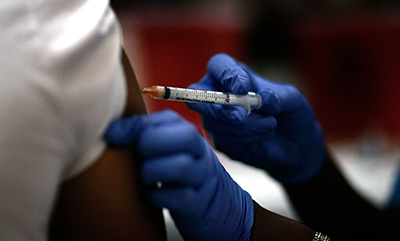New Public Vaccination Programs in India Face Similar Obstacles as Private Vaccination.
 Increased public vaccination programs to help protect children in rural India from Hib and a spectrum of other diseases need to overcome multiple hurdles to produce equitable vaccination rates across the country, according to a study led by SPH researchers.
Increased public vaccination programs to help protect children in rural India from Hib and a spectrum of other diseases need to overcome multiple hurdles to produce equitable vaccination rates across the country, according to a study led by SPH researchers.
Abhishek Sharma, an MPH student concentrating in global health, was the lead author on the study, which analyzed vaccinations against Haemophilus influenzae type b (Hib). Hib bacteria can lead to meningitis, pneumonia, and serious ear infections, all of which have critical health implications for resource-poor communities.
In the study, published online in BMJ Open, Sharma and co-author Warren Kaplan, an assistant professor of global health, looked specifically at private-sector health care from 2009 to 2012. The study was the first nationwide analysis of private-sector Hib vaccine coverage in India, where most of the country’s rural poor rely on public health programs.
Despite the Hib vaccine being available to private-sector markets since 1997, just 4 percent of children in rural India are protected against the disease. There was better coverage in urban areas with good access to private sector health care, the researchers found, as well as a link between vaccination coverage and parents’ purchasing capacity and private pediatricians’ prescribing practices.
India has the highest Hib disease burden in the world; its 2.4 million cases and 72,000 Hib-related deaths annually account for more than 4 percent of total child deaths in the country.
To combat HiB, in 2011 the Indian government began the public-sector introduction of a pentavalent vaccine that combines protections against Hib, diphtheria, pertussis, tetanus, and hepatitis B. The pentavalent vaccine was rolled out in stages to various Indian states; full public coverage throughout India began in April 2015 and is scheduled to continue thereafter.
However, the study cautions that public sector rollout of the Hib-containing pentavalent vaccine will be difficult in those rural Indian states with poor access to private and public sector health care. “If public vaccine delivery systems are not upgraded, most of the Indian children living in the states with poorly performing public sectors will not benefit from introduction of the pentavalent vaccine,” Sharma said.
This paper is based on research Sharma conducted during his summer 2014 fellowship with BU’s Frederick S. Pardee Center for the Study of the Longer-Range Future. In addition to Kaplan, study co-authors include Maulik Chokshi, Habib Hasan Farooqui, and Sanjay P. Zodpey of the Public Health Foundation of India, based in New Delhi.